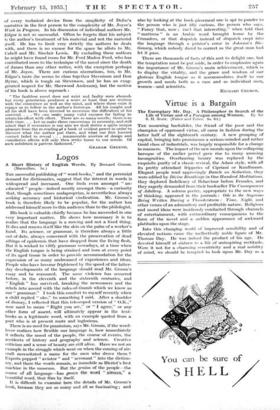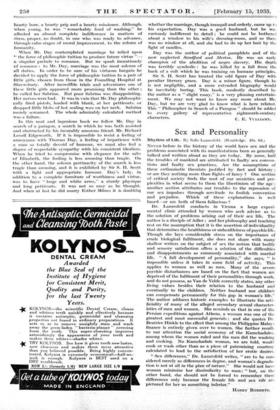Virtue is a Bargain
The Exemplary Mr. Day. A Philosopher in Search of the Life of Virtue and of a Paragon among Women. By Sir S. H. Scott. (Faber and Faber. 8s. 6d.)
THE mourning backslider, the friend of the poor and the champion of oppressed virtue, all came in fashion during the latter half of the eighteenth century. A new grouping of capital, bringing into prominence a serious-minded and rather timid class of industrials, was largely responsible for a change in manners. The impact of the new morals upon the collapsing baroque of the earlier period gave rise to many amusing incongruities. Overbearing luxury was replaced by the exquisite purity of a classic revival, the Adam style, with all its pretty attendant fripperies of Cipriani or Kauffinann. Elegant people read approvingly Bun,cle on Seduction, they were edified by Divine Breathings in One Hundred Meditations, they deplored Indelicacy of Behaviour before Females, and they eagerly demanded from their bookseller The Consequences of Adultery. A solemn poetry, appropriate to the new ways of thinking, appeared in the journals : Ode to the Supreme Being Written During a Thunderstorm : Time, Night, and other verses of an admonitory and profitable nature. Religious and moral ideas were insidiously conducted through channels of entertainment, with extraordinary consequences to the form of the novel and a sudden appearance of awkward platitudes upon the stage.
Into this changing world of improved sensibility and of elevated notions came the ineffectively noble figure of Mr. Thomas Day. He was indeed the product of his age. He devoted himself at sixteen to a life of uninspiring rectitude. Were it not for a charming eccentricity and a real nobility of mind, we should be tempted to look upon Mr. Day as a hearty bore, a hearty prig and a hearty rnissioner. Although, when young, he was "remarkably fond of washing," he affected an almost complete indifference in matters of dress, proper, no doubt, in one who was ready to advance, through calm stages of moral improvement, to the reform of humanity.
When Mr. Day contemplated marriage he relied upon 'the force of philosophic tuition to produce future virtue "- a singular prelude to romance. But we speak incautiously of romance : to Mr. Day, marriage was the most solemn of all duties. In order to be sure of his virtuous bargain he decided to apply the force of philosophic tuition to a pair of little girls, chosen from those in the Foundling Hospital at Shrewsbury. After incredible trials and adventures one of these little girls appeared more promising than the other: he called her Sabrina. But poor Sabrina was disappointing. Her nerves were bad. It was in vain that Mr. Day philosophi- cally fired pistols, loaded with blank, at her petticoats, or dropped little blobs of hot sealing wax on her neck. Sabrina merely screamed. The whole admirably calculated method was a failure.
In this neat and ingenious book we follow Mr. Day in search of a paragon, a search in which he was both assisted and obstructed by his incurably amorous friend, Mr. Richard Lovell Edgeworth. If it is impossible to resist a feeling of annoyance with Thomas Day, a feeling of impatience with a man so totally devoid of humour, we must also feel a degree of respectable sympathy with his consistent idealism. When he tried to compromise with elegance for the sake of Elizabeth, the fooling is less amusing than tragic. On the other hand, the solemn pertinacity of the search is less tragic than amusing, and it is exhibited by Sir S. H. Scott with a light and appropriate humour. Day's lady, in addition to a complete furniture of worthiness and virtue, was to have large and white arms," a sturdy physique and long petticoats. It was not so easy as he thought. And when at last he did marry Esther Miloes it is doubtful whether the marriage, though tranquil and orderly, came up to his expectation. Day was a good husband, but he was curiously indifferent to detail ; he could not be bothered about a window to his wife's dressing-room, and so there was no window at all, and she had to do up her hair by the
light of candles. -
Day was the author of political pamphlets and of the now neglected Sandford and -Merton. He was• an early champion of the abolition of negro slavery. His death was terribly symbolic : he was killed by a fall from the back of a colt which he was training on humane principles.
Sir S. H. Scott has treated the odd figure of Day with peculiar literary grace. Day is a minor figure, though. he is not negligible, and a more extended biography woulil be inevitably boring. This book, modestly described by the author as a "slight essay," is a very pleasing entertain- ment. We may not want to know any more about Mr. Day, but we are very glad to know what is here related. This Philosopher in Search of a Paragon" should be added to every gallery of representative eighteenth-century











































 Previous page
Previous page